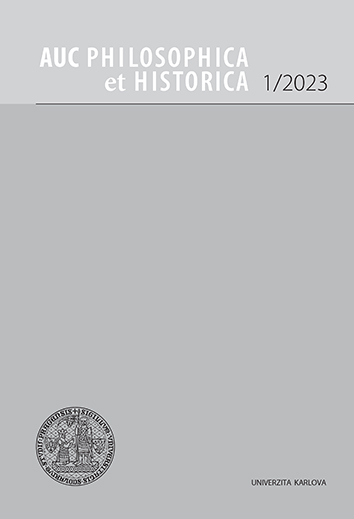AUC Philosophica et Historica (Acta Universitatis Carolinae Philosophica et Historica) is a multidisciplinary academic journal focused on the humanities with more than 50 years of tradition.
The journal is indexed in CEEOL, DOAJ, and EBSCO.
AUC PHILOSOPHICA ET HISTORICA, Vol 1984 No 1 (1984), 39–63
B. Engels o vztazích přírodního a sociálního
Eduard Urbánek
DOI: https://doi.org/10.14712/24647055.2018.84
published online: 15. 01. 2018
abstract
The materialistic conception of history worked out by Marx and Engels both in their co-authored and individually written works represents a contrast to the idealistic conception of history. It is not mere economism or a theory about the decisive role of the economic factor understood in an isolated way. N either is it complete sociologism that ignores the relation between the natural and social, between biological an historical factors. In contradiction to naturalism reducing social reality to natural reality and thus sweeping away the difference between them (nature is given, society is a human product, history is realized by purposeful consciousness), Marx and Engels developed the dialectical conception of the relation between the natural, social, biological and historical factors. In German ideology in the works of Marx and Engels the basic approach has been developed towards the outer nature (the natural environment) and towards the inner nature (the human biological nature) which are given on the basis of which the historical, cultural and social factors are developed through labour and productive activities. At the beginning of human social activity the natural prerequisites both outer and inner play a significant role and thus mark all creation and product of society. This is also reflected in terminology. Marx and Engels distinguish between instruments of production given by nature and those created by civilization, the division of labour has come into being in a natural way and is a subject to natural conditions as well as the relation between man and woman in the process of reproduction: the blood-relationship and collective form of acquisition are also taken as natural. Only gradually work performed during manufacturing activity starts gaining ever greater significance in changing the natural and then the products of labour productive activity are increasingly becoming the social and historical driving forces. The dialectics of the natural and social developments does not disappear, only the proportion of interaction and significance is changing. At work the relations of people towards nature are natural-social relations as well as the relations in the process of reproduction (family relations) are natural-social ones. Marx and Engels in their further common or individual works (but always is contact and under mutual exchange od ideas) used dialectic of the natural and social at the working out of the Asiatic way of production. The relation of the historically changing activity influencing nature was investigated in their works in which they are concerned with the historically conditioned ways of changing the nature and creation of human environment. Especially Marx in his "Capital" and Engels in his unfinished paper "The Part Played by Labour in the Transition from Ape to Man" which contains really topical ideas on ecology. He completely investigated the dialectics of the outer nature and economic activity - the influence of natural differences on the unequality of historical evolution and the social, biological and historical factors. He examined the dependence of the premonogamy forms of the family based on blood and sexual relations and the influence of the new historical driving forces based on labour-productive activity on the origin of monogamy family. Marx and Engels's approach to the dialectics of the natural and social, biological and historical factors are of great and topical significance in solving a number of questions raised by the evolution both of natural science and the contemporary social evolution. 1t primarily concerns the problems of ecology and new aspects of the biological-social relation in connection with the development of ecology and new aspects of the biological-social relation in connection with the development as e. g. common biological anthropology (E. O. Wilson). The Soviet scientists pay great attention to these issues leaning on methodological and theoretical approach of Marx and Engels. Engels's contribution to the solution of these problems is especially stressed in the presented paper.
